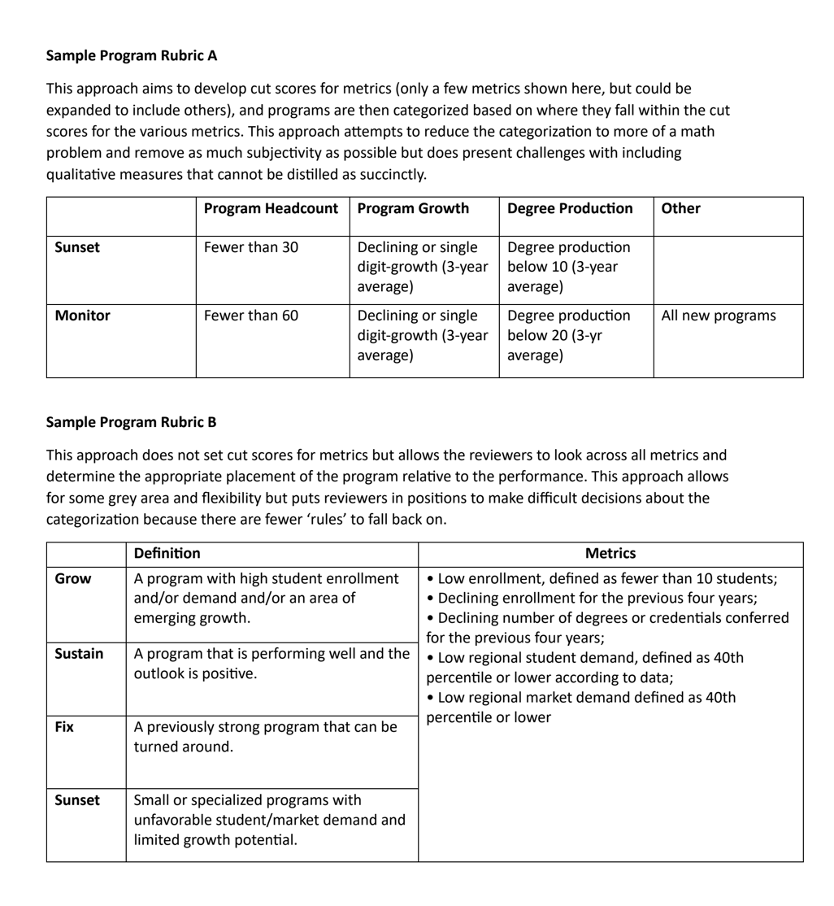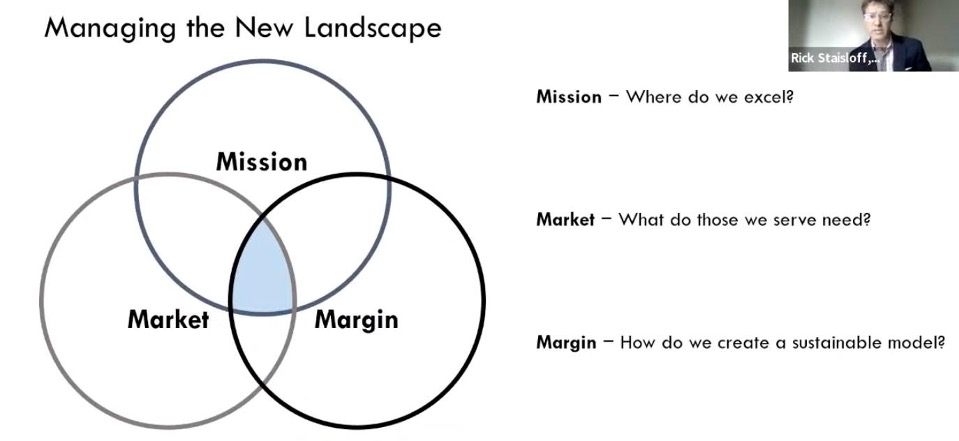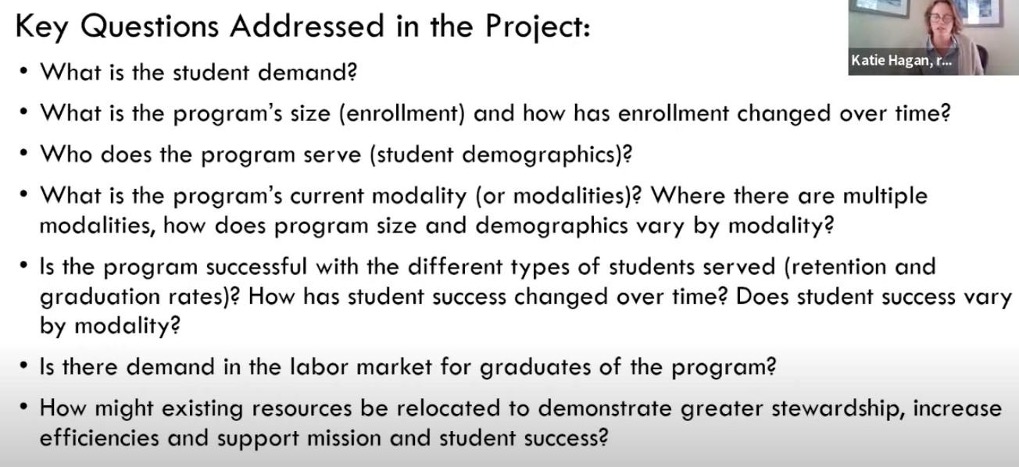Commenting about higher education finances is a frequent topic of mine. My most recent blog post was about fluctuating higher education funding at state institutions. In June, I wrote about a number of colleges and universities announcing closures, mergers, and restructuring.
I have years of experiences with university cost-cutting measures. I began my career in finance as a CPA consultant at Price Waterhouse (before it merged with Coopers & Lybrand to become PwC). I left PW to work for a client as its CFO. Over the years, I was a CFO at five separate companies, including a year-and-a-half at American Public University System, before being promoted to President and CEO.
UNC-Greensboro Program Cuts
A friend of mine sent me a link to an article published in The Chronicle of Higher Education on August 28 titled “‘Nobody Knows Where the Line Is’ – when cost cutting universities hire consultants, who’s really making the decisions?” As I read the article, I thought it would be worth writing about given my experiences.
Written by Erin Gretzinger and David Jesse and produced in partnership with The Assembly, the article opened with a statement that administrators at the University of North Carolina at Greensboro foresaw the battle over cutting costs at UNCG before consultants from the rpk Group began any major work.
The rpk Group was hired to work with administrators including UNCG’s provost to conduct an academic-portfolio review. The outcome of that review was the UNCG Chancellor’s approval of the provost’s recommendation to cut 20 programs, mostly in the College of Arts and Sciences.
Gretzinger and Jesse wrote that dozens of colleges across the U.S. have conducted academic-portfolio reviews. They added that the reviews attempt to answer the question “what parts of a college make money, and which parts don’t?” The co-authors wrote that consulting firms have built a lucrative business helping colleges answer that question.
The authors noted the work of the rpk Group assisting West Virginia University with its recommended program cuts and the University of Kansas with its program reviews. They wrote that professors who are critical of these types of analyses see consultants as shields for administrators, while others view them as hatchet men.
The Chronicle authors and The Assembly obtained 600 pages of email correspondence and interviewed more than a dozen employees to piece together how the process at UNCG “unfolded.”
Prior to telling the story about the process, the authors provided background information about rpk Group founder Rick Staisloff, including his experiences as a college CFO that shaped his consulting firm, and the approach his firm takes with its engagements.
Also included in the background information are interviews with faculty at UNC Greensboro who challenged the right of the administration to look at a college like “a company” or to hire a consulting firm that embraces the market forces in education. In my opinion, failing to analyze a college’s business model and the forces that drive enrollment and tuition is a mistake by leadership.
An interview with UNCG Chancellor Gilliam provided more depth to the situation and analysis. Gilliam arrived at UNCG in 2015 and watched it grow to more than 20,000 students by 2019. He expressed his regret at having spent most of the $30 million growth in revenues during his early years on new faculty and staff positions instead of setting it aside.
Enrollment Decline Triggered the Review
UNCG’s enrollment growth stopped in 2019. The pandemic hit in 2020 and reduced the number of first-generation students attending. By the fall of 2023, enrollment fell by 12 percent. For each percentage point drop, state appropriations, tuition, and fees were reduced by more than $3 million. A $36 million drop in revenue followed the $30 million upswing.
The decline in revenues prompted Gilliam and his team to cut 375 administrative and staff positions. In the summer of 2022, Gilliam realized that cutting admin positions alone would not solve UNCG’s problems. He hired rpk Group to optimize UNCG’s academic portfolio through “a data-informed and transparent process” and find ways to “operate more strategically and with a return-on-investment lens.”
The faculty were “concerned about how rpk’s work and data would be leveraged.” Statements from UNCG’s AAUP chapter president indicated the faculty’s naïveté. “They were very slick, and they were very smooth. They had answers to everything … that was deep in the weeds of the numbers. So, they were hard to challenge.” From my perspective, I hope that skilled consultants have deep knowledge of their area of expertise just like experienced faculty members.
Organizing UNCG’s data was rpk’s first task. The data was to be made available to the public on dashboards. For several months, rpk met biweekly with a UNCG data team comprised of tenured and tenure-track faculty, adjunct faculty, and staff to hash out metrics and decide “how to consider excess credits.”
Program Scoring Rubric Developed
Months later, after the data was collected, UNCG and rpk met to determine how to evaluate it and make decisions. Developing a rubric to evaluate programs was not a task with a straightforward route. The authors wrote that emails show that the UNCG administrators wanted rpk to offer them guidance. At the same time, rpk reminded the administrators that they (rpk) were hired to assemble the data, not to recommend specific cuts.
Ultimately, a senior associate at rpk sent the administrators two sample rubrics for evaluating the portfolio. One rubric was based on metrics to sunset programs based on total headcount, degree production, and program growth. The other rubric recommended eliminating small or specialized programs with unfavorable student/market demand and limited growth potential.
The first rubric was designed to help make decisions that were more of a math problem. The second rubric came with a warning that reviewers had to make difficult decisions because there were “fewer ‘rules’ to fall back on.”
The authors included a chart for each rubric that they obtained from their email reviews. A copy of the chart is appended below.
 A pertinent quote from UNCG’s CFO was, “It’s rather simple calculus.” Chancellor Gilliam followed: “When people don’t like the outcomes, they challenge the process.”
A pertinent quote from UNCG’s CFO was, “It’s rather simple calculus.” Chancellor Gilliam followed: “When people don’t like the outcomes, they challenge the process.”
The UNCG Academic Portfolio Review Task Force received “predetermined, broad rubric categories, though the process of how those categories were selected remains murky.” Programs were scored as “exceeding expectations,” “meets expectations,” “approaching expectations,” or “needs examination.” None of those are in the samples above.
UNCG’s administration and rpk stated that the rubric was developed by UNCG, though some of its components came from both parties. Some faculty members believed that rpk’s methodology strongly influenced the product.
Rubric Dashboards Published
The dashboards and rubrics were published on October 6. According to the authors, “panic on campus quickly followed.” The rubrics had dozens of erroneous metrics. UNCG issued three iterations of the rubric, and the final iteration was issued on October 23.
Chancellor Gilliam said, “the errors were caused by a combination of bugs in the data, miscoding, and the release times of some fall data.” He noted that the data “’fixes’ did not materially change any of the results.”
No program “exceeded expectations.” Slightly more than 60% of the programs scored “meeting expectations,” and 37.2% scored “approaching expectations.” Only one program scored “needs examination.”
Students Notified Programs Considered for Discontinuation
On January 14, students received emails indicating that their major would be among the programs recommended for discontinuation. Included in this group were anthropology, physical education, physics, religious studies, secondary education in geography, minors in Chinese and Russian, all course offerings in Korean, and graduate programs in drama, geography, interior architecture, math, nursing, communication sciences and disorders, and special education.
Faculty members argued that the rubrics did not support the logic of the cuts. Chancellor Gilliam said that many decisions came down to a few key indicators, such as very low student credit hours generated. He pointed out that exceptions were made for mission-critical programs like gender and women’s studies and African American studies.
Chancellor Gilliam approved the cuts 16 days after the provost published them. At this point, the number of layoffs remains unknown. The Faculty Senate censured the Chancellor and the Provost, and the general faculty assembly passed a vote of no confidence in the Provost.
The authors interviewed rpk Group founder Rick Staisloff. He explained that “none of this is a math problem.” The numbers didn’t tell “you what to do.” The ambiguity and subjectivity of the decision-making left the faculty in a state of confusion. Some blame rpk, and others blame the process. While I understand Mr. Staisloff’s response, I believe that metrics heavily influenced the decisions for the programs recommended for discontinuation.
UNC-Greensboro Cuts Approved by System Board
Meanwhile, other UNC system institutions will be required to review their academic programs every seven years based on a new policy passed by the system’s Board of Governors this spring. A system-wide academic-portfolio review will be conducted every two years.
At the July Board of Governors meeting, which approved the UNCG cuts, board members commended the campuses for looking toward the future. One board member was quoted as saying, “moving forward, we’re gonna have to do this on every single campus.”
My Thoughts
I’ve known Rick Staisloff since his days as Notre Dame College’s CFO. I’ve never hired him or his firm, but I’ve shared a few conversations with him about changes in higher education over coffee or lunch.
I first wrote about rpk Group’s work with the University of Kansas Board of Regents. I reviewed their slide presentation to the KU Board of Regents and republished three slides that emphasized their review process, including the metrics that they examined. One slide that I liked is appended below.

I noted that Mission and Market have an equal weighting in the questions that rpk believes universities need to ask as they review the effectiveness of programs. I suspect that another slide from that presentation was adapted or utilized in a similar presentation to UNCG.

Notably, the UNCG Academic Portfolio Review Task Force chose to eliminate the labor demand rubric recommended by rpk, which is mentioned in the slide above. Based on my experiences as a consultant, that was likely not a surprise to rpk.
When Inside Higher Ed wrote about the West Virginia University decision to cut programs, I wrote about that decision and added a few comments from Rick Staisloff.
“Public institutions are facing a crossroads, and most have taken one of three approaches – ‘denying the necessity of serious cuts, attempting to put off the issue by temporarily filling budget holes left by dried-up federal aid, or reworking their long-term plans and sloughing off nonessential expenditures.’ He added that he thinks it’s long past overdue for institutions to take the more strategic view.”
There are many reasons why consulting firms are hired. Sometimes, it’s because the CEO is new and wants cover for his or her changes. That doesn’t appear to be the case with UNCG. Chancellor Gilliam arrived in 2015 and approved adding many new positions paid for with revenues from its growth in enrollment from 2014 through 2018.
Chancellor Gilliam only considered evaluating UNCG’s academic portfolio after cutting 400+ administrative and staff positions. The Chancellor, his CFO, and his Provost should have communicated more effectively throughout the process. It appears from the emails disclosed that the rpk Group was not hired to recommend cuts and did not do so.
After using rpk Group to organize the data presented in the rubric dashboard, UNCG should not have succumbed to the Advisory Committee’s pressure to undo the rpk Group format for fear of being unable to reproduce it. That “unwinding” of the data organization led to the identification of dozens of instances of misclassified data and data errors.
I’m not a fan of leadership teams that use consultants as a cover or an excuse for recommending cuts and changes. I am a fan of using consultants to educate leadership teams and managers on organizing and evaluating their data based on experiences with similar companies or institutions.
Universities and university systems will continue to review and examine their academic programs as they respond to demographic decline and market pressures. Institutions and systems that have not gone through this process will likely issue RFPs for consultants to assist them.
I like rpk Group’s approach and experience. In this situation, they assisted in organizing the data and in “educating” the various constituents. Their fees appear to be reasonable versus the seven figure quotes I’ve seen from other consultants. Without the overhead and encumbrances of a large national network of offices, they’ve built an expertise and fee structure that matches nicely with leaders faced with tough decisions.
Will we continue to see administrators and consultants raked over the coals by faculty and others as recommendations are made to pare expenses to cover reductions in revenues? We will. There are reputable consultants that can help a college or university. I believe rpk Group is reputable and more transparent than some. In the end, transparent communications will keep a bad news situation from getting worse.











